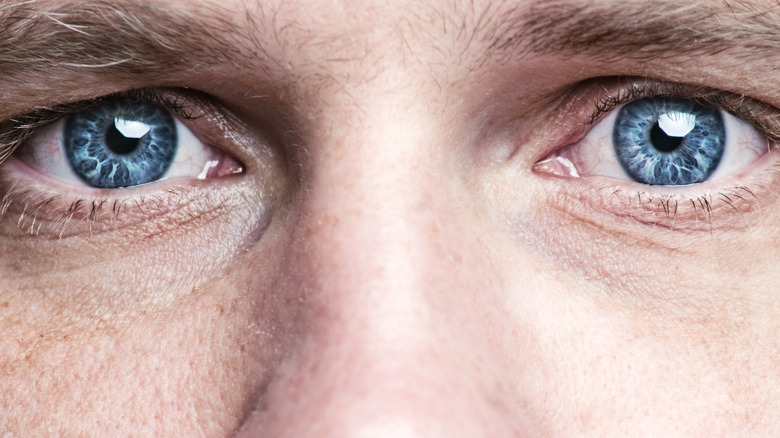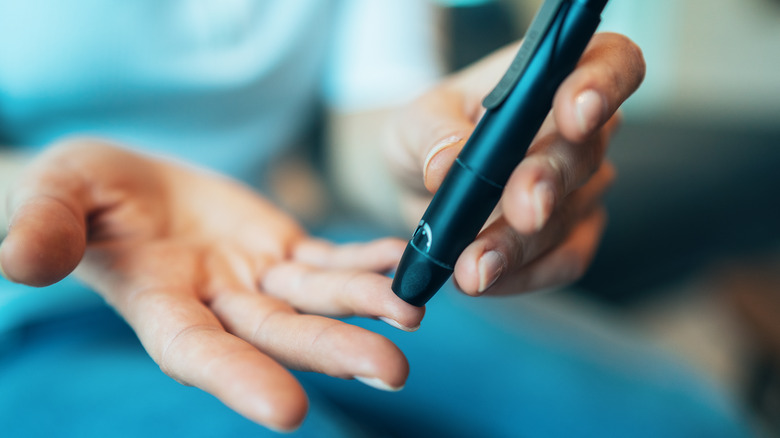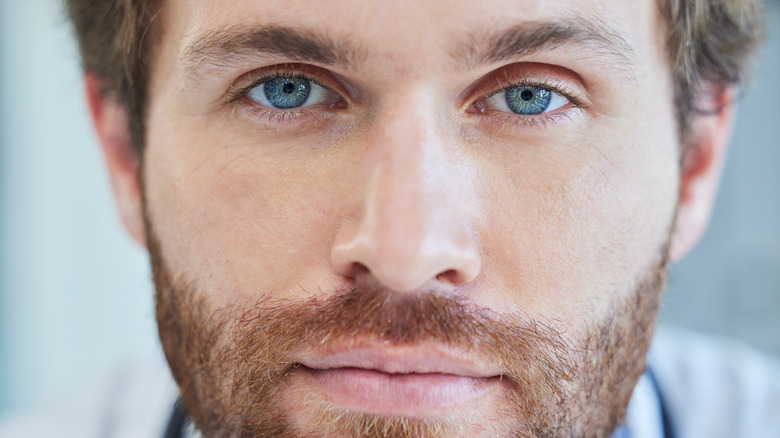What Having Blue Eyes Can Predict About Your Future Health
Eye color is one of those things that makes us somewhat unique, especially if you have a hue that's not common where you live. People often comment on it, compliment it, and ask you questions about whether or not your parents have the same shade.
As it turns out, a variation in your genes does have everything to do with it. The shade itself is dependent on just how much melanin is present in the front layers of your iris, per MedicinePlus. Those with more melanin exhibit darker hues like brown, while those with less end up with lighter shades like blue and green. Interestingly, according to a survey of 1,000 people by 1-800 Contacts, blue eyes are typically associated with confidence and expressiveness. Research published in the Journal of Pain also indicates that people with the shade of the sky in their peepers tolerate pain better.
Having blue eyes may also be an indicator of the state of your future health. For instance, people with blue eyes may be at greater risk for age-related macular degeneration, per a 2000 study published in Transactions of the American Ophthalmological Society. This might be because those with lighter-hued eyes are more sensitive to UV light exposure. Continued UV light absorption can lead to eye damage and even vision loss, per WebMD.
You might be more at risk for melanoma
If you have blue peepers, you're more prone to getting a type of cancer called uveal melanoma, at least when compared with your brown-eyed friends, per a 2020 study published in the International Journal of Molecular Sciences.
Also known as intraocular or ocular melanoma, uveal melanoma is pretty rare. Only 5 people in a million get it, according to the University of Pittsburgh Medical Center (UPMC) Hillman Cancer Center. In the U.S., about 2,500 people are diagnosed with it yearly. As the name suggests, it affects the uvea, the middle layer of your eye. Other factors that put one at risk of this particular type of cancer include skin color (fair skin), having freckles, and being older.
This surprising side effect of having blue eyes may also have to do with increased sensitivity to UV light, although the science on that isn't very clear (per Mayo Clinic). Nevertheless, it won't hurt to protect your peepers by investing in a good pair of sunglasses, one that blocks most UVA and UVB light. Wearing a hat and putting on sunscreen can help, too.
Type 1 diabetes is a concern with blue eyes
A 2011 study in the Mediterranean region found that blue peepers and fairer skin were risk factors for type 1 diabetes (T1D). T1D, which is an autoimmune reaction, occurs when your pancreas produces very little or no insulin. Symptoms of this health condition include feeling thirsty often, excessive hunger, an increase in urinating frequency, unexplainable weight loss, mood swings, fatigue, and blurred vision (per Mayo Clinic).
T1D is rarer than type 2 diabetes, but can be treated by maintaining healthy blood sugar levels, making healthy food choices, exercising, and working with your healthcare provider. Diagnosis of the condition involves testing blood glucose levels, doing a glycosylated hemoglobin test (A1c), and an antibody test. The most common age ranges of diagnoses for T1D are 4 to 6 and 10 to 14 years, and while it isn't necessarily genetic, having a family member with this health condition does put you more at risk of getting it (via Cleveland Clinic).
Alcohol dependency and blue eyes are connected
One big health problem connected to having blue eyes actually has to do with your drinking habits. According to a 2015 study published in the American Journal of Medical Genetics, those with lighter-shaded irises may be more dependent on alcohol than their brown-eyed peers. As study co-author Arvis Sulovari of the University of Vermont shared in a press release, "This suggests an intriguing possibility — that eye color can be useful in the clinic for alcohol dependence diagnosis."
Although there are no definitive theories laid out as to why this might be, one idea suggests that people with darker eyes might be more sensitive to the effects of alcohol, which could be preventing them from consuming enough to become dependent on the stuff. Apparently, the same cannot be said about their blue-eyed friends.
Alcoholism is related to many short-term risks like road accidents, injuries, behavior changes, and miscarriages. Long-term effects include alcohol use disorder (AUD), depression and anxiety, memory issues, a weak immune system, and other health concerns like cardiovascular disease, stroke, liver disease, gastrointestinal issues, and cancer of the throat and colon, per the Centers for Disease Control and Prevention.
If you or anyone you know needs help with addiction issues, help is available. Visit the Substance Abuse and Mental Health Services Administration website or contact SAMHSA's National Helpline at 1-800-662-HELP (4357).
Women with blue eyes might be prone to developing endometriosis
Endometriosis is a condition of the womb. Deep infiltrating endometriosis (DIE) is both a rare and more serious form of endometriosis where tissue that's supposed to be inside your uterus grows outside of it and also invades other organs like the bladder, intestines, and sexual organs, per Medical News Today.
According to a 2014 study published in Human Reproduction, light-hued irises were more prevalent in women with this specific kind of endometriosis than any other color. Endometriosis typically affects women between the ages of 15 and 44, and the abnormal growth of tissue can lead to inflammation, scarring, and cysts (via Johns Hopkins Medicine). Although science hasn't quite figured out what causes endometriosis, there are some theories, like genetics and reverse menstruation.
If you experience really painful period cramps, irregular bleeding cycles, soreness during or after sex, tiredness, abnormal bowel movements during menstruation, and spotting between your periods, you may want to get yourself checked for this health condition. If you have blue eyes, all the more reason to, at least according to the research.
Not everything is bad news future health-wise for blue-eyed people
Some of the surprising things your eye color can tell you about your health actually involve positive news. For blue-eyed people, this also means a lower chance of certain health conditions like vitiligo and cataracts.
According to a 2012 University of Colorado School of Medicine study, blue eyes, the same characteristic that predisposes someone to melanoma, can also be less of a risk factor when it comes to the skin condition vitiligo, which is a chronic autoimmune disorder that manifests as white patches on the skin and hair (per EurekAlert). "Genetically, in some ways vitiligo and melanoma are polar opposites," explained Dr. Richard Spritz, director of the CU School of Medicine's Human Medical Genetics and Genomics Program. "Some of the same genetic variations that make one more likely to have vitiligo make one less likely to have melanoma, and vice-versa."
If that isn't enough good news for blue-eyed people, there's more. Apparently, you might not need to worry about developing cataracts (at least prematurely) if your eyes are the color of the sky. A 2014 study published in the International Journal of Ophthalmology found that those with darker eye shades were more at risk of developing cataracts. But cataracts are part of aging for almost everyone, so perhaps this isn't really the biggest win. Attractiveness and kindness aside, you may want to keep an (ocean-colored) eye out for these health concerns in your future.






